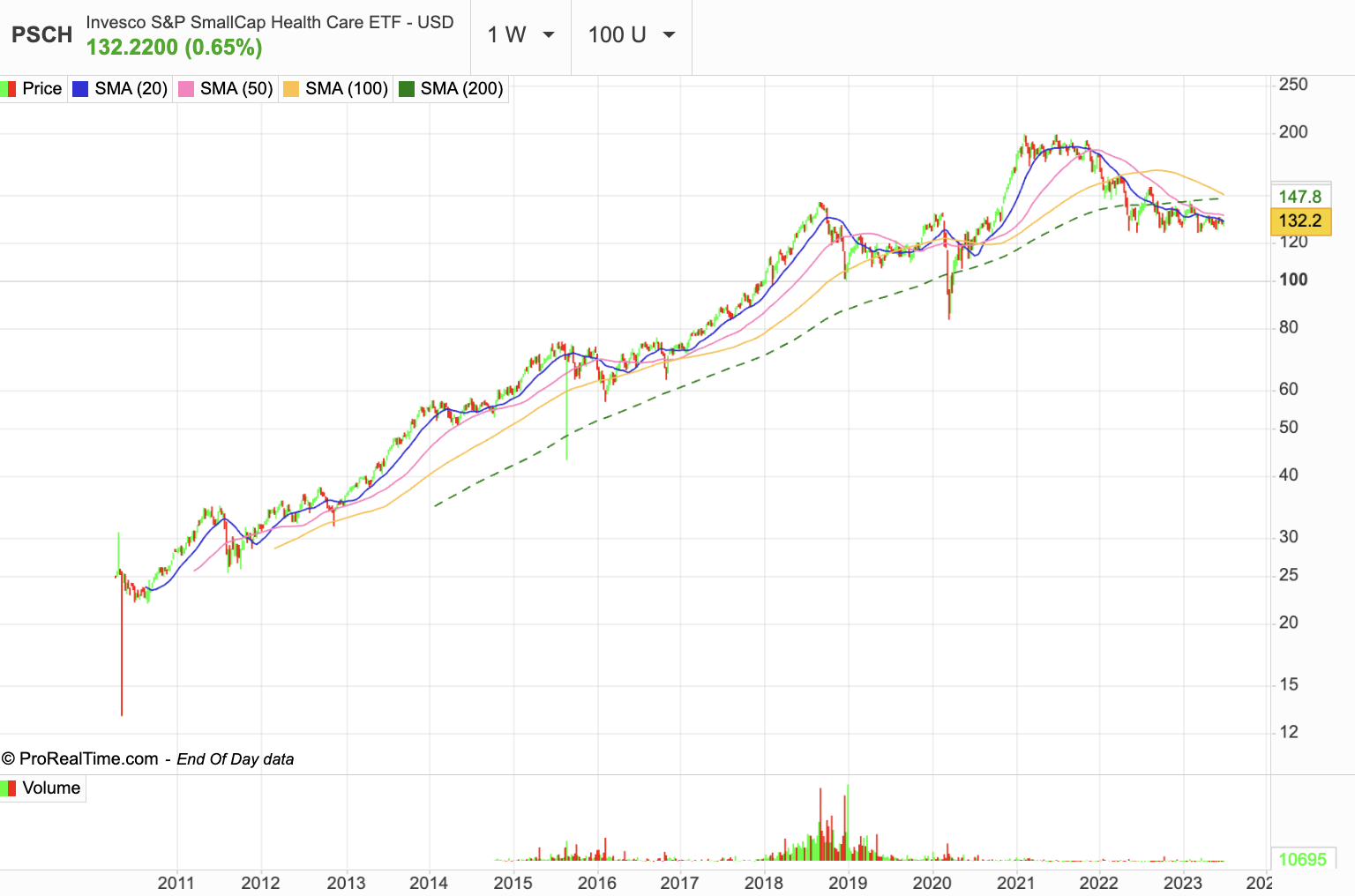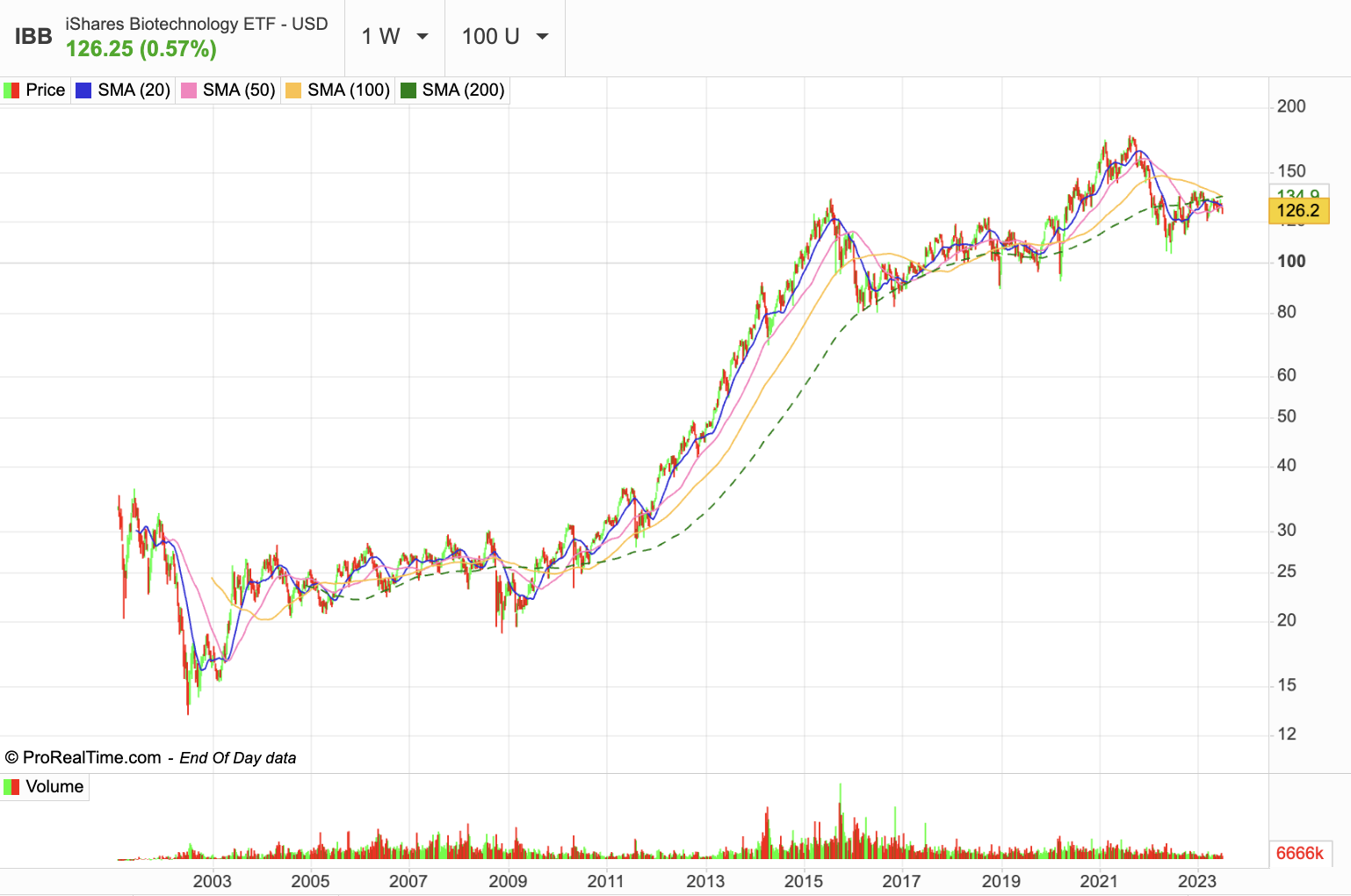The healthcare industry is currently experiencing significant transformations driven by advancements in digital health, the emergence of innovative therapies, the growing focus on personalized care, and the adoption of value-based healthcare models. In this analysis, we will discuss three prominent healthcare sector ETFs: Invesco S&P Small-Cap Health Care (PSCH), iShares Biotechnology (IBB), and VanEck Pharmaceutical (PPH). These ETFs provide investors with exposure to the dynamic healthcare sector and its potential for long-term growth.
Invesco S&P Small-Cap Health Care ETF (PSCH)
The ETF aims to track the S&P SmallCap 600 Capped Health Care Index, providing exposure to a diversified basket of 77 U.S. small-cap companies. While the healthcare sector is known for its defensive nature and lower volatility, the ETF has experienced underperformance compared to technology companies since the beginning of the year. Among the ETF's major constituents, Ensign Group holds the highest weighting at 5.31%, followed by Merit Medical, Conmed, and AVN Healthcare at 4.61%, 3.87%, and 3.71% respectively. The top fifteen holdings account for 45.34% of the ETF's total weighting. Morningstar has awarded the ETF a 3-star rating out of 5. The ETF has $281 million in assets under management (AuM) and carries a total expense ratio of 0.29%.
The healthcare sector holds significant importance in the U.S. economy, constituting 17.8% of the gross domestic product (GDP) in 2021. It benefits from a robust system of medical research and development, fostered by collaborations between the healthcare, higher education, and technology industries. The aging U.S. population, particularly the Baby Boomer generation, continues to drive strong demand for healthcare services. Recent years have witnessed rapid advancements in vaccines, therapeutics, diagnostics, and patient care, setting the stage for increased investment and innovation in the healthcare sector in the coming years.
Investing in healthcare small-cap companies can offer compelling opportunities due to their potential for substantial growth driven by innovation, technological advancements, and access to niche markets. However, it is important to acknowledge that investing in small-cap healthcare companies entails higher levels of market risk and volatility compared to large-cap counterparts. The healthcare industry is fiercely competitive, making it challenging for small-cap companies to establish a foothold among industry giants. Moreover, the high costs associated with research, development, and regulatory compliance pose significant hurdles for these companies, making it difficult for them to meet the demands of the market. Prudent risk assessment and thorough due diligence are crucial when considering investments in healthcare small-cap stocks.

Ishares Biotechnology ETF (IBB)
The ETF IBB provides exposure to US Biotechnology Equities (88.6%) and is built to track the ICE Biotechnology Index. It provides physical exposure and generates a stream of income by distributing dividends. The IBB consists of a carefully selected basket of 270 companies, with 15 of them accounting for 62.69% of the total weight. Notably, Vertex Pharmaceuticals is the largest position in the ETF, representing 8.17% of the portfolio. This is an advantage for the ETF as Vertex exhibits a strong financial foundation, with an increasing market capitalization, EBITDA, and Free Cash Flow (FCF).
The biotechnology industry has experienced a boom in venture capital (VC) funding during the past four years. Over $34 billion was raised by biotech businesses globally in 2021, more than double the $16 billion raised in 2020. It may represent a significant advance in the identification, targeting, and administration of medications. The startups that have the most to gain are those with cutting-edge platform technologies, which serve as a foundation or infrastructure for the development of various cures.
The field of biotechnology is unlocking immense potential in healthcare. Advancements such as Cell Therapy 2.0 allow for precise targeting of diseased tissues and a wider range of diseases, including solid tumors. Next-generation gene therapies offer the potential to cure genetic diseases by editing and modulating DNA and RNA. Precision medicine enables early diagnosis and personalized therapies based on patient's unique genetic profiles. Machine learning accelerates drug discovery by efficiently analyzing vast amounts of data. Strategies are being developed to tackle challenging targets, and new delivery methods ensure the safe and precise administration of therapies. These breakthroughs hold promise for improving patient outcomes and transforming healthcare. The convergence of artificial intelligence (AI) and Machine Learning (ML) technologies with a deeper understanding of biology holds the promise of accelerating drug discovery, making it faster and more efficient. By harnessing the power of ML, researchers can uncover new therapeutic targets, improve drug candidate selection, and enhance the overall efficiency of the drug development process, ultimately leading to the discovery of safer and more effective treatments.
However, it's important to note that these companies often operate on the premise of discovering a breakthrough product or solution, which comes with inherent risks. The average cost of developing a new drug exceeds $1 billion, leaving no room for failure. Moreover, biotechnology companies typically work on innovative therapies or address emerging markets, necessitating adherence to the FDA's rigorous process validation stages, including Process Design, Process Qualification, and Continued Process Verification. Due to the complex nature of the healthcare industry, many of those companies face challenges in successfully navigating the FDA's process validation stages, and as a result, fail to bring their products to market.

Vaneck Pharmaceutical ETF (PPH)
PPH provides investors with exposure to a carefully selected portfolio of 25 securities in the pharmaceutical sector. With approximately $400 million in assets under management (AuM), the ETF offers access to industry leaders and top performers over the past two decades, including Johnson & Johnson (7.83%), Novo Nordisk (6.36%), Eli Lilly (6.05%), and Novartis (5.82%). The ETF is divided into two sectors, with a relatively limited diversification: Health Care (78.4%) and Other (21.6%), and is geographically allocated to the United States (59.7%), the United Kingdom (14.9%), and other regions (25.5%). Tracking the MVIS US Listed Pharmaceutical 25 Index, the ETF's 15 largest holdings make up 80.14% of the total weight.
The pharmaceutical sector is gaining significance due to globalization and a growing global population, which is leading to increased awareness and demand for healthcare. As the world's population continues to age, the development of new drugs becomes paramount. Statista estimates that while currently only 9% of the global population is aged 65 or older, this is projected to rise to 16% by 2050. This demographic shift will have a profound impact on the sales of pharmaceutical companies, and the substantial investments in research and development (R&D) suggest that the pharmaceutical component of the ETF will likely grow even further in the coming years. Major players such as Johnson & Johnson, Sanofi, AstraZeneca, Merck, Eli Lilly, GSK, Pfizer, and Novo Nordisk, who are leaders in specific areas of the pharmaceutical sector, are expected to maintain their dominance in the years ahead.
The development of new pharmaceutical products requires substantial resources and investments, often involving nearly a decade of research. Amplifying R&D efforts constitutes a significant portion of these pharmaceutical companies' revenue and is influenced by factors such as projected lifetime global revenues from a new drug, expected development costs, and policies and programs that shape the supply and demand dynamics of prescription drugs. The COVID-19 pandemic has further solidified the trust in certain pharmaceutical companies due to their successful development and distribution of vaccines, as well as their contributions to patient care and support.
No comments:
Post a Comment
Note: Only a member of this blog may post a comment.